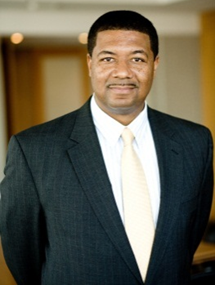Diversity an essential ingredient of global businesses, EY executive explains
January 17, 2014
|
Mays Business School
Ken Bouyer spends his time looking for ways to support diversity in his company, EY (formerly Ernst & Young). Bouyer is the Americas Director of Inclusiveness Recruiting for EY and a passionate supporter of diversity who has spent years contributing to a corporate culture that empowers diverse hires to succeed. According to Bouyer, one of the most important factors that contributes to that success is a global mindset. In a globally connected business environment, clients of professional services firms like EY expect innovative solutions that succeed on a global level. In order to deliver that, businesses need to help their people cultivate a global mindset and develop inclusive leaders who make the diverse mix and perspectives of its people work to achieve better results.
“Challenge the way you think,” Bouyer recently told a standing-room-only Mays Business School crowd and at least 100 others looking on. “Diversity of thought and perspective drives innovation. This is the magic of diversity.”
EY has 175,000 employees in 150 countries and reported $25.8 billion in FY13 global revenues. Globalization, in fact, is one of the megatrends shaping EY’s business. In 2005 there were 47 companies listed in the Fortune Global 500 that were headquartered in emerging markets. Today, just 8 years later, that number is 135. Globalization means that the world of work that students are entering is more interconnected than ever before — bound by complex supply chains and where customers and competitors can be found the world over … often just a mouse click away.
Like many large, globally integrated companies, EY is looking to hire future leaders who demonstrate a willingness to think and work beyond their own perspectives and borders. “For our high-performing teams, our people need the knowledge and skills to understand our global business environment, be agile and innovative, deal with ambiguity, influence others and lead inclusively,” Bouyer told the Mays crowd.
In the presentation, he also explained one global mindset model that discusses three key components: intellectual, psychological and social capital.
- Intellectual capital encompasses global business savvy, cognitive complexity, a cosmopolitan outlook and knowledge of cultures around the world and their economic and political issues, concerns and hot topics. To explain this concept, Bouyer described how he has worked with different clients, many of which have grown their businesses outside the U.S. Over time, these companies have come to understand the cultural nuances, and have corrected course to ensure their global operations achieve success.
- Psychological capital springs from a passion for exploring other parts of the world and the ability to adapt to uncomfortable situations. “Travel,” Bouyer advised the crowd. “You’ll be amazed at what you find.”
- Â Social capital consists of diplomacy, engagement and interpersonal impact among strong networks with people from other cultures. Those who have a natural sense of curiosity and genuine respect can build trust and forge strong relationships with people from different countries and even people on their own teams with very different backgrounds and perspectives right here in the U.S., Bouyer said.
He also stressed the importance of inclusive leadership, which is critical in an organization that serves multinational clients. Inclusive leaders leverage the different perspectives on their teams. This drives innovation, whether it’s selling to a new market segment or creating a new product.
So how do future leaders develop a global mindset and an inclusive leadership style? Bouyer had many tips to offer the Mays students in attendance. He encouraged students to understand how their life experiences frame how they might view a situation; to have real and authentic conversations; to build relationships with people who have different experiences and viewpoints; and to work on projects with people who have different backgrounds and perspectives.
Organizations like EY expect their employees to bring their own unique perspectives with them. But what differentiates them is their ability to interact and work with all types of people, Bouyer added. “You have to ask yourself if you are ready to serve companies around the world. The world is different than what you’re seeing at A&M. My message to you … prepare now!
About Mays Business School
Texas A&M University’s Mays Business School educates more than 5,000 undergraduate, master’s and doctoral students in accounting, finance, management, management information systems, marketing and supply chain management. Mays consistently ranks among the top public business schools in the country for its undergraduate and MBA programs, and for faculty research. The mission of Mays Business School is creating knowledge and developing ethical leaders for a global society.



